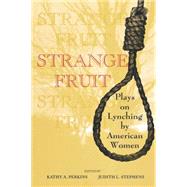Strange Fruit
, by Stephens, Judith L.- ISBN: 9780253211637 | 0253211638
- Cover: Paperback
- Copyright: 2/1/1998
This anthology is the first to address the impact of lynching on U.S. theatre and culture. By focusing on women's unique view of lynching, this collection of plays reveals a social history of interracial cooperation between black and white women and an artistic tradition that continues to evolve through the work of African American women artists. This collection includes examples of both one-act and full-length dramas written over a time span of approximately eighty years (1916-1994). Production styles represented range from the early realism of Angelina Weld Grimke'sRachel(1916) to the folk drama influences of Georgia Douglas Johnson'sSunday Morning in the South(1925), to the experimental techniques of bifurcated characters and multiple narratives found in Endesha Ida Mae Holland'sMiss Ida B. Wells(1983). Lillian Smith'sStrange Fruit(1945), based on her controversial and best-selling novel, is published here for the first time. Unfamiliar plays by lesser known playwrights such as Corrie Crandall Howell'sThe Forfeit(1925) and recent plays by contemporary playwrights such as Sandra Seaton'sThe Bridge Party(1989) and Michon Boston's Iola'sLetter(1994) demonstrate the development of the genre and continuation of the tradition. Introductory essays by the editors provide a historical and critical context for the plays and link them to the wider art world through the work of visual artists, musicians, and choreographers such as Meta Vaux Warrick Fuller, Lois Malou Jones, Billie Holiday, Nina Simone, Katherine Dunham, and Pearl Primus. Current language usage seems inadequate to express the perspective represented by these plays. What should we call a collection of plays by black and white women addressing the cultural legacy of lynching? Since the plays reflect black women's leadership in the drive for interracial cooperation in the anti-lynching movement, perhaps ' womanist/feminist drama' best describes this landmark exploration of women's contribution to the American stage.







